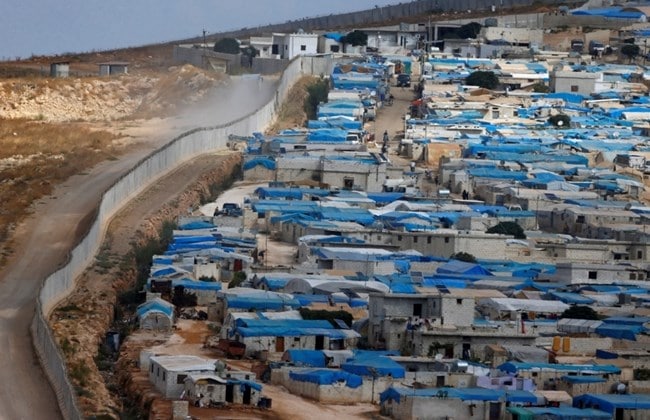Pro-Assad forces advance in southern Aleppo but rebels continue counter-offensive in southeast Idlib
LATEST
- Head of Notorious Sednaya Prison Dead, Circumstances Unclear
- Turkey: We Have Fired on Kurdish Canton in Afrin
Destroying any notion of a “de-escalation zone”, battles between pro-Assad and rebel forces are surging in northwest Syria, with each side claiming success.
Rebel factions, joined by the hardline Islamist bloc Hayat Tahrir al-Sham, continued to assert gains in a counter-offensive in southeast Idlib Province. The assault, which began on Thursday, has cut into a regime salient that was threatening the Abu Duhur base.
Pro-opposition outlets said the latest gains on Saturday included the villages of Tal Marq and al-Khwain.
In recent weeks the Assad regime’s military and foreign allies had entered Idlib, almost all of which has been controlled by the opposition since spring 2015. They were as close as 2 km (1.2 miles) from Abu Duhur when the rebel counter-offensive began.
Rebels moving into the village of Rubayah (see map):
E. #Idlib: video showing #HTS storming Rubayah. https://t.co/duNtzS5IKO pic.twitter.com/WGB28DHyLH
— Qalaat Al Mudiq (@QalaatAlMudiq) January 14, 2018
About 35 miles away in southern Aleppo Province, pro-Assad forces claimed that they took 15 villages on Saturday from the HTS bloc. The advance in al-Hass plateau region appears to have been assisted by a pullback of HTS fighters from the frontline.
The offensive is hoping to secure about 45 km (28 miles) of highway south of Aleppo city.
Russia, Turkey, and Iran had declared a de-escalation zone across Idlib and parts of neighboring Hama and Aleppo Provinces this autumn. However, the pro-Assad attacks never stopped, and Russia supported them on the pretext of fighting HTS, which it said was excluded from the agreement.
Russian warplanes have retaliated for the rebel counter-offensive with attacks on civilian areas across Idlib, killing at least 11 people in the latest bombing.
Turkey has supported the counter-offensive with vehicles, weapons, and ammunition after warning the Assad regime and Russia that attacks on Idlib’s civilians must stop.
Ankara fears another influx of refugees from the fighting, adding to the more than 3 million displaced Syrians already inside Turkey. Up to 130,000 residents have moved from southern to northern Idlib since December.
Head of Notorious Sednaya Prison Dead, Circumstances Unclear
Brig. Gen. Mahmoud Maatouq, the former head of Sednaya prison where several thousands of detainees were tortured and executed, has died in circumstances.
Maatouq was described by dissidents as “the guardian of hell” and “director of the Sednaya holocaust” because of his leadership of a prison in which between 5,000 and 13,000 prisoners were executed from 2011 to 2015.
See Syria Daily, July 3: Report — Up to 13,000 Killed by Torture Since 2011
Some pro-Assad outlets said Maatouq died of a heart attack. But others said he died in the line of “duty”, with still others saying he was killed in fighting near Harasta in the East Ghouta area.
Pro-Assad forces have been embroiled for weeks in fighting with rebels near the Damascus suburb of Harasta, with the anti-Assad factions threatening to overrun a key base responsible for rocketing and shelling of opposition-held towns.
Turkey: We Have Fired on Kurdish Canton in Afrin
Turkey says it has launched an attack on the Kurdish canton of Afrin in northwest Syria, a day after President Recep Tayyip Erdoğan gave the Kurdish militia YPG a one-week ultimatum to withdraw or face assault.
Turkish media, citing “a source in the region”, said the Turkish military hit YPG targets to prevent a “terror corridor” along Turkey’s borders. At least 40 shells were fired during the bombardment from Turkey’s Hatay Province on the border.
A “security source” also said a military convoy including tanks has been dispatched to the Syrian border.
YPG spokesperson Rojhat Roj said Turkey regularly bombards Afrin, but Saturday’s shelling was more intense and lasted longer: “We are seeing preparations [for an offensive]. The YPG will defend itself against any aggression.”
Turkey has stepped up its military intervention in Idlib and Aleppo Provinces, in part to establish a frontline with Afrin. Ankara considers the Syrian Kurdistan Democratic Unionist Party (PYD) and its YPG militia to be part of the Turkish Kurdish insurgency PKK.

